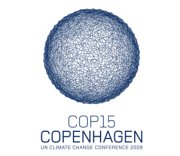 UN fails in last-ditch efforts to get world leaders to commit to a maximum 2C rise as draft texts get weaker
UN fails in last-ditch efforts to get world leaders to commit to a maximum 2C rise as draft texts get weaker
By Suzanne Goldenberg, John Vidal and Jonathan Watts
The UN’s climate summit was heading for meltdown this afternoon with countries unable to agree on emission cuts and blaming each other for the descent towards a humiliating fiasco.Â
Last-ditch efforts by the UN to get the 120 world leaders to at least commit to hold temperatures to a maximum rise of 2C in the next century were failing, as a series of draft political agreement — each weaker than the last — were circulated among countries.Â
Versions of the overarching political text seen by the Guardian showed that profound disagreements between countries had not been resolved. Only weak, long-term aspirations for an overall global emissions cut of 50% by 2050 and an 80% cut by 2050 for rich countries. These commitments, and the 2C pledge, were assumed to be givens in any deal.Â
As the draft text reached its sixth version, there were some glimmers of hope, as some nations put more encouraging language into the agreement, including a reference to a limit of 1.5C being supported by the science. But more versions are expected.Â
No commitments were sought for any of the major areas of dispute, such as a mid-term 2020 target to reduce greenhouse gas emissions. The European Union’s plan to raise its pledge from a 20% cut to 30% cut in emissions by 2020 was blocked, dashing hopes of prompting a series on increased offers from other nations. The latest text even dropped a deadline for reaching a legally binding treaty by the end of 2010. At the start of the week Gordon Brown was insisting that six months was the maximum acceptable delay.Â
A financial package intended to raise billions of dollars to help poor countries to adapt to climate change and develop green technology was also in doubt as rich countries declined to guarantee the money, simply affirming that they “supported a goal of mobilising $100bn by 2020”.Â
The lack of ambition and near total absence of commitment from the leaders is a bitter disappopintment for the British prime minister, Gordon Brown, and the UK government which has led worldwide efforts to forge an ambitious, legally binding global agreement to stop the rise in carbon emissions by 2020 and reduce them dramatically in the following 30 years.Â
Negotiators will now continue to work on individual agreements like deforestation, technology, finance but without strong leadership the chances are that it will take years to complete.Â
Hopes that Barack Obama would deploy his authority as the leader of the world’s largest economy — and his personal political charisma — to try to broker a last-minute deal were also frustrated. A visibly angry Obama told world leaders that it was past time for them to come to an agreement. “The time for talk is over,” he said.Â
But Obama did not offer any new pledges of action — either in increased emissions cuts or clarity on America’s contributions to a climate fund for poor countries. He also held the line against China, saying America would not yield on the vexed issue of measuring and verifying emissions cuts promised by developing countries.

Comments are closed.